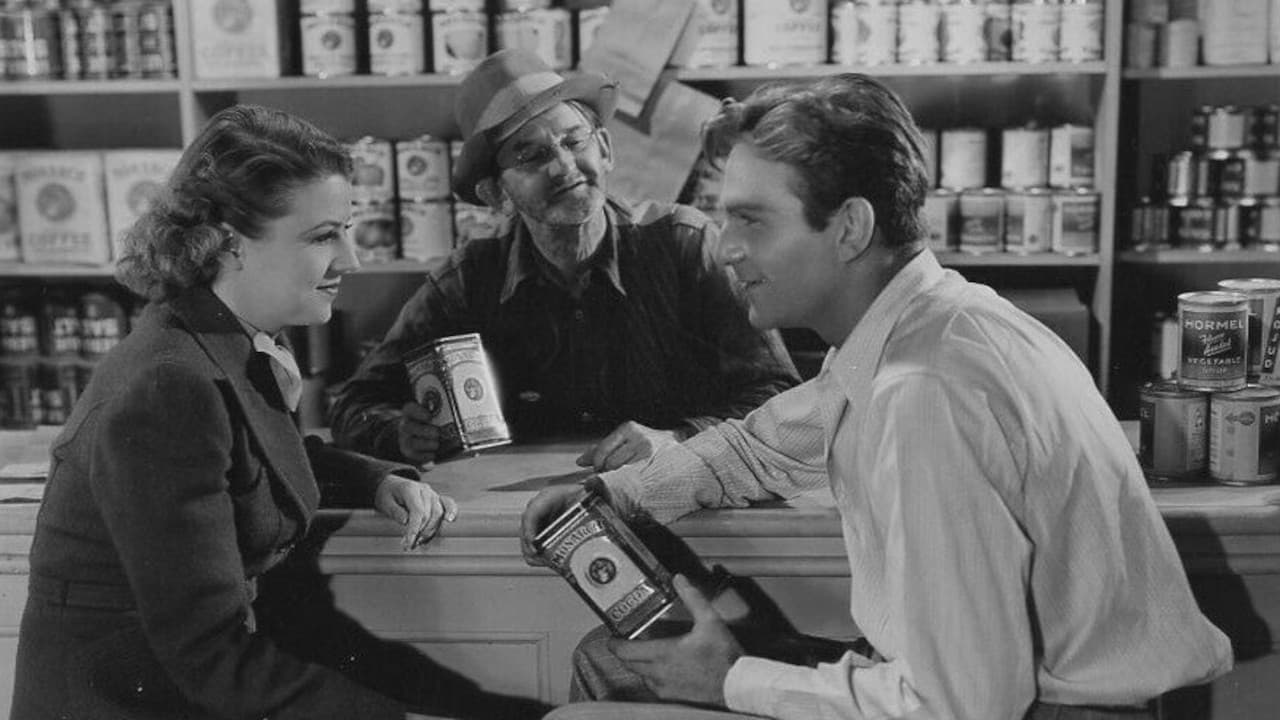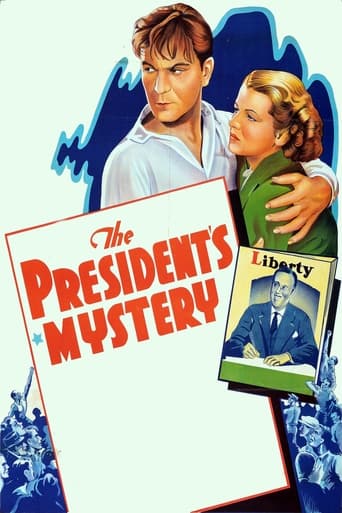

Waste of time
... View MoreIntense, gripping, stylish and poignant
... View MoreBetter than most people think
... View MoreVery interesting film. Was caught on the premise when seeing the trailer but unsure as to what the outcome would be for the showing. As it turns out, it was a very good film.
... View MoreNice programmer with a fascinating backstory. Based on a plot idea (really just a theoretical question) from then-President Franklin D. Roosevelt. It's about a rich man with an unhappy life who, after reading the Roosevelt magazine article that lead to this very film being made (how meta!), decides to liquidize all his assets and skip out on his terrible wife to go become a socialist reformer in a small town. Naturally a pretty young woman is behind this gentleman's sudden ideological transformation. After he sets his plan into motion, something happens that threatens to unravel it all.The Roosevelt connection is interesting, especially if one has read about the President's struggles and personal life around this time. It makes one wonder if anybody in 1936 thought it was strange that a sitting President would be mulling over ideas about middle-aged rich men disappearing and setting up new lives to get away from their problems. Beyond that, I think it's a good B movie with an intriguing premise. The performances are all solid and the direction is creative here and there. It creaks and groans at times, no doubt a mix of its Poverty Row pedigree and the quality of available prints today. It's worth a look but probably more so for the historical elements than because it's particularly entertaining as a mystery film.
... View MoreProving that he was a regular fellow, Franklin D. Roosevelt dabbled in a bit of creative writing to contribute to the story with Samuel Hopkins Adams in this story of a wealthy man (Henry Wilcoxin) fed up with being one of the richest men in the world, how it affects his personal life, and the lack of freedom and privacy he has to do what he wants. So he cashes out everything and disappears, ending up in a small town, where, guess what happens, he becomes an adviser to some of the happenings going on, loosing his freedom and privacy, while the rest of the country wonders what happened to him, especially when his wife is murdered and he is accused of the crime.This storyline sounds like something that would embarrass Frank Capra, and while the acting and dialog are sound, it is the execution of the structure of the plot that raises eyebrows. A bit too much happens over the course of an hour, like an over-exaggerated version of that bad morning that starts off with you stubbing your toe, unable to find your keys or wallet, not having hot water, etc. So while you give kudos to the president for pursuing a dream outside politics, you can't help but wonder how things could have turned out had he toned down the dramatics a bit. He tosses in some comic relief with an effeminate butler (was there any other kind during the golden age of movies?) who ironically ends up saving the day.
... View MoreI saw an obviously truncated version of the picture with a running time of about fifty two minutes whereas the original length states eighty minutes. That's quite a bit of missing footage and may account for the question mark ending. It seemed to me that the hero Blake (Henry Wilcoxon) saved the Springvale Cannery by rallying the townfolk while his nemesis George (Sidney Blackmer) basically did the same thing by bringing in outside agitators to stir up the locals. So either way the citizens got their cannery back by pulling together against the corporate moneyed interests and their slick lawyers.The hitch in the story occurs when James Blake is accused of murdering his wife after closing out all of his investments and bank accounts. You have to admit it did look suspicious that he disappeared even though he was testing a theory posed by FDR on whether someone with millions could simply vanish with all that money. Back in the Thirties it might have still been possible, but then again, John Corzine lost a billion dollars about a year ago and says he doesn't know where it went and it doesn't look like he's been called on it. So who knows.Anyway, actor Wilcoxon who I haven't seen before, was fairly effective using the old Clark Kent ruse with the glasses to appear like two different characters. Betty Furness appears as his country sweetheart in an unconvincing role, perhaps offering a clue as to why she made a bigger splash in the world of consumer affairs. Though the story's a bit muddled it's entertaining enough nevertheless, and there's even some unexpected comic relief from Blake's butler Roger (Barnett Parker) who amuses with his upper crust style.
... View More"The President's Mystery" isn't really a mystery, but it's a well-made B-picture with an interesting premise. President Franklin D. Roosevelt was fond of reading murder mysteries. On 12 May 1935, at a White House luncheon, FDR offered his lunch guests an idea for a mystery: How could a millionaire disappear and start a new life for himself, under a new identity, yet manage to take his wealth with him? One of the guests at that luncheon was magazine editor Fulton Oursler, who wrote mystery stories under the pseudonym 'Anthony Abbot'. Intrigued by FDR's idea, Oursler contacted five other authors (including S.S. Van Dine, creator of the popular Philo Vance mysteries), and they set out to write a novel that could answer FDR's question. This was published as "The President's Mystery Story", with FDR listed as co-author (although he contributed only the premise). It is not a very good book, due to its patchwork structure: the various chapters are written by different authors of radically different styles and widely varying talent. But largely due to its novelty appeal and FDR's personal popularity, "The President's Mystery Story" became a best-seller.This movie is the film version, with a title card in the opening credits explaining FDR's participation. The screenplay was written by Lester Cole and the grossly overrated Nathanael West, who brings none of his own sardonic viewpoint to this movie.Industrialist James Blake (the underrated actor Henry Wilcoxon, who later submerged his career into C.B. DeMille's) has messed up his personal life and he wants to start over in a new identity ... but he doesn't want to lose the fortune he's already compiled. He hits upon a very clever plan which might actually have worked in the 1930s, but which nowadays (with computer databases and biometric I.D.) couldn't possibly succeed. Blake locates a crooked investment firm run by two con men (one of them is played by Charles Williams, the meek little actor who played Eustace Bailey in "It's a Wonderful Life"). Claiming to have enough evidence to put the crooks in prison, Blake bullies them into abandoning their investment firm without dismantling it. Blake then secretly takes over the brokerage without any paperwork to document the transfer. Operating in the open, he then proceeds to invest his own fortune in the crooked brokerage house ... thus neatly robbing himself! (But how does he withdraw the money after he deposits his cheques?)Because Blake is publicly perceived to lose his fortune, nobody is surprised when he vanishes ... an apparent suicide. He establishes a new identity with plausible ease (again, this was before high-tech I.D.) and it looks like he's accomplished his goal. But then something goes wrong...There are several good performances here, most notably Wilcoxon's, Sidney Blackmer's and a comic turn by Barnett Parker in his usual silly-ass Englishman mode, and a performance by the underrated John Wray. Byron Foulger gives his usual inept performance as a milquetoast. Betty Furness is dull and unattractive, as usual for her.I'll rate this movie 5 out of 10. FDR's participation is almost nonexistent, and co-screenwriter Nathanael West's influence on the material is minor. But this modest film has some genuine merits and an unusual story; I recommend it.
... View More